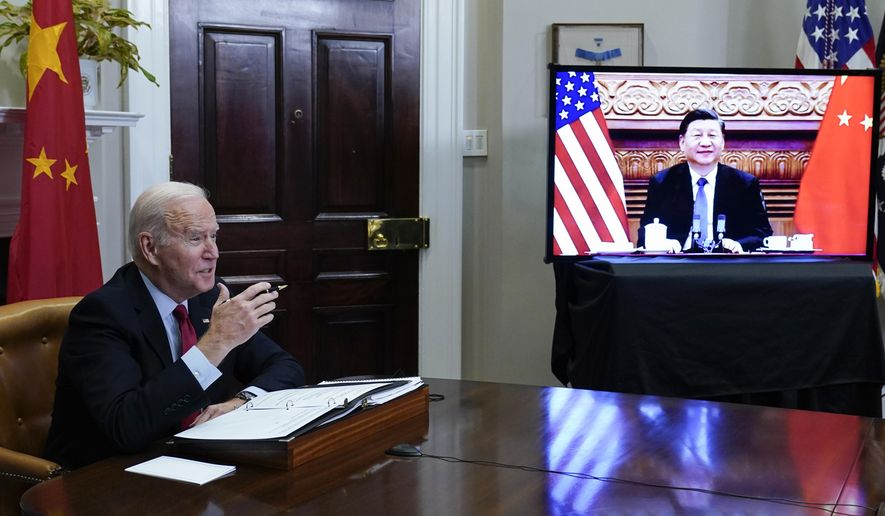|
Russia’s unending war in Ukraine, North Korea’s expanding nuclear weapons threats and China’s increasing military moves toward Taiwan are among the complex global security challenges President Biden faces as he heads into the second half of his term in 2023. National Security Team Leader Guy Taylor and military correspondent Ben Wolfgang assess the president’s record so far and outline the challenges ahead, noting consensus among analysts that the president had as many — if not more — foreign and national security failures as successes during his first two years in office. The list of fumbles included the flopped attempt at reviving the Obama-era Iran nuclear deal and the disastrous 2021 Afghanistan pullout. Things are unlikely to get easier. U.S.-China tensions over Taiwan are already a flashpoint and appeared on course to sharpen further. Pentagon correspondent Mike Glenn dove into U.S. Indo-Pacific Command’s revelation that a Chinese fighter pilot flew within 20 feet of a U.S. Air Force reconnaissance plane in mid-December, forcing the U.S. aircrew to take evasive maneuvers to avoid a collision. |
New Year’s threat from Pyongyang |
|
North Korean leader Kim Jong Un, a China ally, also appears poised to ratchet up tensions in 2023. New Washington Times Asia Editor Andrew Salmon analyzes the motivations behind and reactions to the regime’s test-firing of missiles on New Year’s Eve and New Year’s Day, as well as its vow to increase its nuclear arsenal. Mr. Kim called during a New Year’s meeting of his ruling Workers’ Party for an “exponential” increase in atomic arms, as well as the development of a new intercontinental ballistic missile capable of reaching the U.S. mainland. Foreign policy realists, meanwhile, are warning that Washington may be overly optimistic about the prospect for success in Ukraine, where a messy Moscow-Kyiv stalemate could be the best-case scenario over the coming year. Ukrainian leaders spent the last week of 2022 signaling desires for a U.N.-moderated peace summit, but experts say the prospect of direct talks with the Russians remains out of reach, as Russian President Vladimir Putin closed out the year by announcing a ban on oil exports to Western powers. |
Chinese nukes built with U.S. technology |
|
National Security Correspondent Bill Gertz has a comprehensive look at how Beijing‘s rapid buildup of nuclear forces has been assisted by American nuclear and missile technology obtained by Chinese spies and through U.S. space and nuclear cooperation in the 1990s. Among the alarming findings is one highlighting the existence of recently constructed bases in western China, where up to 360 multi-warhead Chinese ICBMs are being deployed. On a separate front, China‘s military is building up its submarine forces for its large-scale military modernization, according to the latest annual Pentagon report on the Chinese military. Mr. Gertz also offered a deep dive on a trove of previously classified CIA documents made public at the end of 2022, revealing how the documents expose long-hidden details on one of the spy agency’s most prominent Cold War controversies, involving defecting Soviet intelligence agents and U.S. counterspy programs targeting the Kremlin’s strategic deception operations against the West. |
Fewer deportations of convicted criminals, gang members |
|
A different kind of controversy is brewing on the U.S. southern border, where U.S. immigration statistics show worrying trends. The Times’ Stephen Dinan reports that deportations ticked up in 2022 as the pressures of the COVID-19 pandemic receded, but the number of convicted criminals and gang members ousted from the country declined. Immigration enforcement officials blamed the chaos at the southern border for its difficulties, saying they have had to siphon resources away from their traditional monitoring functions to help conduct catch-and-release missions on the unprecedented number of people flowing into the country. |
In our opinion |
|
Times columnist Jed Babbin closed out 2022 by highlighting Mr. Biden’s foreign policy failures and warning that America faces a slate of rising problems from Europe to the Middle East and Asia, singling out for concern the recent “strategic partnership” signed between Saudi Arabia and China. Retired three-star Army Gen. Keith Kellogg, who advised former President Trump and former Vice President Mikes Pence, argues that the Biden administration needs to be tougher toward Mr. Putin, making it clear he can either “lose the Russian army in the field to defeat or negotiate an end state” to the Ukraine war. Columnist Clifford D. May takes aim at conservative critics of Ukrainian President Volodymyr Zelenskyy, calling them “unserious” purveyors of clickbait. Mr. May, founder of the Foundation for Defense of Democracies think tank, goes so far as to assert that the “anti-Ukrainian right is de facto allied with Code Pink, Win Without War, and other far-left groups triggered by increases in American defense spending and the strengthening of NATO.” |
Thanks for reading Threat Status. Don’t forget to sign up here and get it delivered to your inbox each week. And if you’ve got questions, Ben Wolfgang and Guy Taylor are here to answer them. |
• Guy Taylor can be reached at gtaylor@washingtontimes.com.
• Ben Wolfgang can be reached at bwolfgang@washingtontimes.com.








Please read our comment policy before commenting.